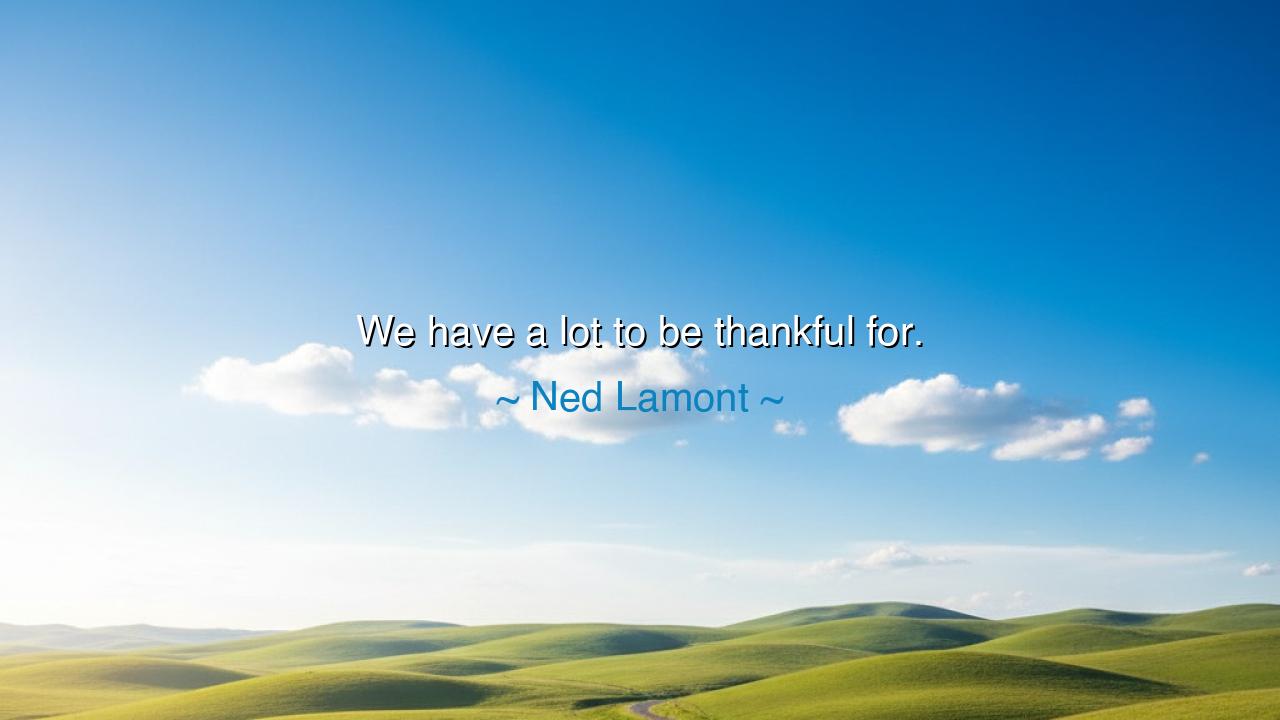
We have a lot to be thankful for.






Hear the words of Ned Lamont: “We have a lot to be thankful for.” Simple in form, yet profound in meaning, these words remind us that gratitude is not measured by the grandeur of blessings but by the awareness of them. Too often, human eyes are blinded by longing for what is absent, while failing to see the abundance already present. This saying calls us back to the ancient path of recognition, where hearts are lifted not by possessions alone, but by the spirit of thankfulness.
The origin of such words lies in the heart of leadership. Ned Lamont, as a public servant, speaks to his people not with a boast or a complaint, but with a reminder: that even in hardship, there is abundance; even in trial, there are victories worth cherishing. His phrase echoes the voices of prophets and sages who, in times of famine or conflict, urged their people to look not only upon the weight of their burdens, but upon the blessings that sustained them still. For the eye that sees only scarcity breeds despair, but the eye that sees abundance kindles hope.
Consider the story of Abraham Lincoln during the darkest days of the Civil War. Amidst the bloodshed and division of a nation tearing itself apart, he declared a national day of Thanksgiving, reminding the people to be grateful for their resources, their freedoms, and the hope of unity. He knew that gratitude was not a denial of suffering, but a weapon against it. In the same way, Lamont’s words urge us to remember: gratitude is not only for times of peace and prosperity, but especially for moments of struggle, when the soul most needs light.
The power of the phrase also lies in its collective spirit. He does not say “I have a lot to be thankful for,” but “We have.” Gratitude, when shared, binds a people together. When a community remembers its blessings, its divisions grow smaller, its quarrels less fierce. A thankful people are a resilient people, for they draw strength from their common store of blessings. This is why the ancients gathered at harvest feasts—not only to eat, but to remember together that the bounty of the earth was given for all.
And yet, gratitude must not make us complacent. To say “we have a lot to be thankful for” is not to rest in comfort, but to use thankfulness as fuel for continued labor. For blessings bring responsibility. When we give thanks for peace, we must strive to preserve it. When we give thanks for abundance, we must remember the poor. When we give thanks for freedom, we must defend it from corruption and apathy. True gratitude is not idle—it is active, transforming thanksgiving into noble deeds.
What lesson, then, must we carry? That every life, no matter how heavy with burdens, holds treasures worth honoring. To see them requires humility, for pride always desires more and overlooks the small. But gratitude lifts the veil and reveals that our days, our families, our freedoms, and even our struggles are gifts. We do indeed have a lot to be thankful for, if only we pause to see it.
Practical actions flow from this wisdom. Begin each day by naming aloud the things you are thankful for, however simple they may seem. Share gratitude in community—speak to your family, your friends, your neighbors of the blessings you share, for gratitude grows stronger when spoken together. And let thankfulness guide your actions, for the truest way to honor a gift is to use it for good.
Thus, let Ned Lamont’s words endure as a teaching for the generations: gratitude is the shield against despair and the seed of hope. A people who remember their blessings will endure any trial. A soul who lives in thankfulness will never be poor. And a world that gives thanks together will always find the strength to move forward into the light.






AAdministratorAdministrator
Welcome, honored guests. Please leave a comment, we will respond soon